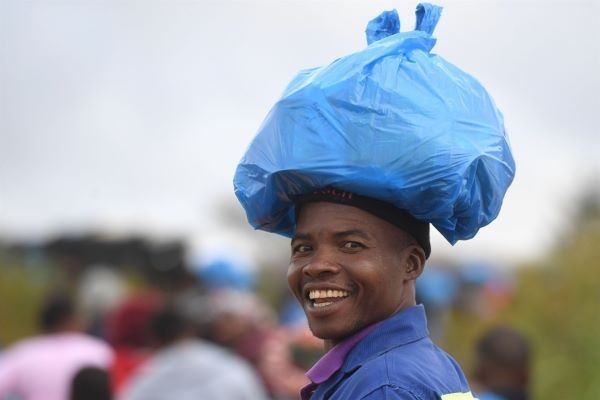
A man smiles having received a food parcel in an informal settlement near Pretoria. (Deaan Vivier, Netwerk24)
Multimedia · User Galleries · News in Pictures Send us your pictures · Send us your stories

A man smiles having received a food parcel in an informal settlement near Pretoria. (Deaan Vivier, Netwerk24)
Multimedia · User Galleries · News in Pictures Send us your pictures · Send us your stories

The new normal is in our hands to design and build. Let us not miss the opportunity to build a future of well-being for all people and an environment that can sustainably continue to give us life in abundance, writes Mamphela Ramphele.
The tiny SARS-CoV-2 virus has refocused the world on the fundamental importance of the well-being of people and the environment essential to life.
We can say with conviction from the bitter experience of the last few months that: It’s Well-being Stupid!
There is no return to normality after Covid-19.
The new normal we have all to contribute to building is one that is driven by socio-economic development that promotes the health and well-being of all people and the environment that gives life to all living creatures.
As President Ramaphosa and his Cabinet focus on setting the framework for the emergence of our society from the multiple emergencies besetting our society, the opportunity must not be missed to tackle the root causes that got us here.
The inequality and inequities that characterise our society, are costly not only for those excluded but for everyone.
Global experience over the last few months has demonstrated very clearly that countries that faired best in this pandemic are those with strong competent governments, more inclusive socio-economic systems, and who measure progress by standards of well-being beyond GDP growth.
New Zealand, Scandinavian countries, South Korea and Scotland, were not only better prepared for this unprecedented emergency but will emerge even stronger.
The return on their investments in well-being, have proven their worth.
The structure of the South African economy is the root cause of its under-performance that has now been laid bare by the Covid-19 crisis.
An economy where 40% of the population share 6% of national income and 39% of people live on a monthly income of R490 is simply not sustainable.
The junk status of our economy should have been a wake-up call for us to commit to fundamental restructuring our exclusionary economic system.
It is disappointing to see how little self-reflection is happening in the private sector in the face of this pandemic beyond complaining about the government's failures.
As we explore how we rebuild our broken socio-economic system we need to take note of the advice of distinguished economists in a paper to be published in the Oxford Review of Economic Policy, that observes that desirable policies have a large return on investment, can be enacted quickly and have a strongly positive impact on climate.
Examples include investment in renewable energy production, such as wind or solar.
As previous research has shown, in the short term, clean energy infrastructure construction is particularly labour intensive, creating twice as many jobs per dollar as fossil fuel investments, as well as being less susceptible to off-shoring.
President Ramaphosa has been exemplary in his leadership.
Our science-based emergency response has won praise both at home and abroad.
The focus on gathering the best brains to advice the government signals a welcome shift to a greater appreciation of competence in policy-making and good governance.
Bolder policy frameworks drawing on all the lessons at home and abroad are needed to fundamentally restructure our socio-economic relations towards a greater focus on well-being for all and care of our life-sustaining natural environment.
Macro-economic orthodoxy has gone out the window as nations have poured resources into emergency rescue and stabilisation packages.
We are now free as sovereign nations to adopt policies that serve our national well-being interests without the fetters of neo-liberal policies jettisoned by even their most ardent champions.
What we need to execute this turnaround is a strong competent accountable governance system. Our President has to act decisively to ensure that we do not waste this crisis, but use it to effect major socio-economic and governance transformation.
He needs to live up to the promise of performance based governance in which he holds his cabinet to account, including letting go of those failing to meet their performance targets, and/or to conduct themselves in a manner appropriate to being servants of the people.
Our Public Health System has been found wanting and needs decisive interventions to ensure that only competent people lead and manage facilities from local clinics to provincial facilities.
We urgently need a National Health System that draws the best from the public and private sectors to collaborate and be adequately funded from pooled national resources.
Competence has to be the gold standard in public health service. We need to audit our current system and ensure that it is fit for purpose. The well-being of not only individuals but of society depends on this.
Our poor quality education continues to drive up levels of inequalities and exclusion in our society. The millions of young people who are victims of this system are trapped in multi-generational poverty, unemployment and substance abuse.
The lockdown has highlighted the extent of the deep digital divide that is locking out poor children from the opportunities that remote education provides.
The cost of data has been kept artificially high by successive government Ministers who are pandering to private sector interests rather than ensuring access to connectivity and its opportunities to all citizens.
We need decisive action to free the data spectrum as the government has promised for so many years to enable all citizens to benefit from connectivity for all their needs.
Two quickest wins for the turnaround of our socio-economic system would be tackling the unspeakable mess on the periphery of our cities and towns, as well as uprooting the corruption in land reform and restitution to free up resources to build prosperity in rural areas.
The promotion of public health and hygiene is impossible in the slums and shantytowns that are home to the majority of poor people.
We need long-term significant investments to create dignified human settlements with high-quality basic services built in collaboration between government and communities ...
Such participatory community-based programmes would restore human dignity and self-respect essential to promoting responsible citizen action to sustain and protect public property for the common good.
Purposeful investments in small and medium enterprises in building and maintaining settlements would lead to sustainable jobs and livelihoods and rekindle dreams in young people.
This would lift thousands out of poverty.
Ending state capture by public servants who are holding the land restitution and reform process to ransom would open a huge vista of opportunities for sustainable rural development.
President Ramaphosa needs to urgently confront public servants and traditional leaders in many rural areas who are holding rural communities captive to poverty due to the corrupt practices that undermine land ownership, food production and livelihoods of hundreds of thousands of frustrated citizens.
Changing the national Constitution to enable land restitution without addressing this huge pink elephant in the room would not lift rural people out of poverty.
What would have an immediate impact are urgent interventions to ensure that restituted land is handed over to appropriate communities and recapitalisation monies be made available to them without the inordinate bureaucracy that humiliates poor people and kills their dreams.
Those public servants are guilty of corrupt practices that hamper development should be removed from the system.
There cannot be a return to "normal".
The new normal is in our hands to design and build. Let us not miss the opportunity to build a future of well-being for all people and an environment that can sustainably continue to give us life in abundance.
- Mamphela Ramphele, Co-Founder of ReimagineSA and Co-President of the Club of Rome